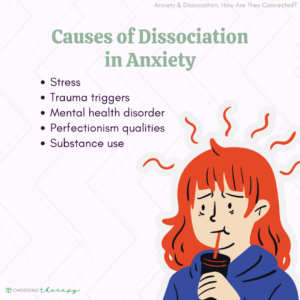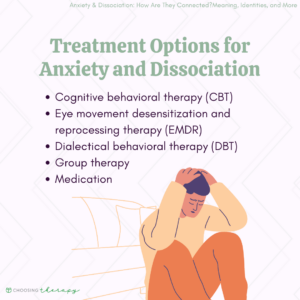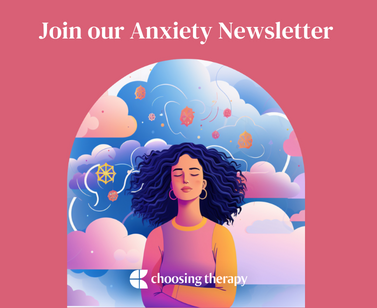Dissociation is one of the symptoms of anxiety, as well as a trigger for anxiety. People with anxiety disorder may use dissociation as an avoidance coping mechanism when their anxiety levels peak and they feel incapable of handling their emotional or physical reactions. Alternatively, when a person dissociates, they may experience anxiety about feeling removed from their body.
Would you like to have less anxiety?
Anxiety is treatable with therapy. BetterHelp has over 20,000 licensed therapists who provide convenient and affordable online therapy. BetterHelp starts at $65 per week. Take a Free Online Assessment and get matched with the right therapist for you.
What Is Dissociation?
Dissociation is an experience in which an individual may feel that they are having an out-of-body experience and not be present to what they are doing in the current moment. Dissociation is a defense mechanism, which allows a person to avoid situations or emotions that feel too painful for them to navigate or address.
Are Anxiety & Dissociation Connected?
Dissociation is a symptom of anxiety, because when a person begins to have intense worries or fears, they may begin to dissociate, or disconnect from these thoughts to cope. Dissociation can also trigger an anxiety disorder, because when a person feels disconnected from their thoughts or body, they can feel disoriented and begin to panic.
Anxiety disorders that commonly include dissociation include:
- Generalized anxiety disorder (GAD)
- Panic disorder
- Social anxiety disorder
- Specific phobias
- Separation anxiety disorder
Can Anxiety & Dissociation Cause One Another?
Anxiety and dissociation can feed off one another and trigger each other. A person with anxiety may dissociate once they start to feel anxious and overwhelmed and not want to experience what they are feeling at that moment in time. If a person is dissociating, they may become easily anxious because they are unaware of their current surroundings or know what they were doing before that dissociative episode.2
Symptoms of Dissociation in Anxiety
Dissociation is a symptom of many anxiety disorders. When a person feels trapped in a triggering situation, they may use dissociation to escape the overwhelming emotions they are feeling in the current moment. A variety of dissociative symptoms show up, including depersonalization and derealization. Frequent dissociation in anxiety also indicates depersonalization-derealization disorder (DPDR).
Symptoms of dissociation in anxiety include:
Depersonalization
Depersonalization is a disruption in a person’s current identity. It is characterized by feeling disconnected from the current time and space. In other words, the person feels detached from the world and could be unaware of the present time or place because their mind is in another time and reality. Depersonalization can prevent a person from joining in the conversations that are happening right in front of them.
Symptoms of depersonalization include:
- Distorted sense of time
- Emotional numbness
- Feeling detached from environment
Derealization
Derealization is the moment a person experiences a distortion in their surroundings but recognizes that they are still present in the current time and space. The surrounding areas will feel real but distorted in some manner. The distortions can be how the surrounding area looks, sounds, or feels.
Symptoms of derealization include:
- Tunnel vision
- Feeling disconnected from surroundings
- Altered sense of time
Options For Anxiety Treatment
Talk Therapy – Get help from a licensed therapist. Betterhelp offers online therapy starting at $65 per week. Free Assessment
Psychiatry for Anxiety – Looking for anxiety treatment that prioritizes you? Talkiatry can help. Find an in-network psychiatrist you can see online. Get started with our short assessment. Visit Talkiatry
What Causes Dissociation in Anxiety Disorders
Dissociation in anxiety disorders is the result of trauma. A person experiencing a moment similar to a past trauma will dissociate so they do not have to feel the same feelings they had in the past. For those with anxiety, dissociation typically lasts for a shorter period. A panic attack may trigger dissociation, as a person may not want to relive or recount the moments that had led up to that panic attack.
Possible causes of dissociation in anxiety include:
- Stress: Through stress or toxic stress, a person might begin to dissociate because they are feeling overwhelmed. Stress can cause a person to dissociate and not look at their present feelings.
- Trauma triggers: The triggers from a traumatic situation may lead to dissociation if a person does not want to relive the traumatic moment. A person who is triggered by trauma will dissociate so they do not have to navigate the feelings that come up.
- Mental-health disorder: Those with a mental-health diagnosis are susceptible to dissociating and anxiety, as anxiety is often a co-occurring disorder of other diagnoses.
- Perfectionism qualities: A person with perfectionism tendencies may dissociate and feel anxious if they are not living up to the standards they set in any activity. It can be likely that this person can become anxious easily and feel the need to dissociate if they are struggling with how they think about the outcome of an activity.
- Substance use: Substance abuse can make a person feel more anxious and panicky. When this occurs, a person might dissociate to avoid navigating the feelings or current moods of those around them.
Is It Anxiety or Another Disorder?
The difference between dissociation related to anxiety vs. a potential other disorder is based on the number of times the dissociation may occur. Frequent dissociation might indicate the presence of another type of disorder. If a person is dissociating more often than not, it’s time to get an evaluation from a professional.
Frequent dissociation may indicate the presence of:
- Dissociative amnesia: Dissociative amnesia occurs when a person forgets information, including personal information, about themselves or events that are in the past.
- Dissociative identity disorder: Dissociative identity disorder is when a person has more than one personality and will switch between these personality or people.
- Depersonalization-derealism disorder (DPDR): DPDR is seen in people who no longer feel that they are a part of their own body or surroundings when they dissociate.
Treatment Options for Anxiety & Dissociation
Treatment options for anxiety treatment and dissociation come from a multifaceted approach of using therapy options and medications. Various forms of therapy will be helpful, and it is common for therapists to combine a few different approaches. If you are experiencing anxiety and dissociation, finding help and treatment at the first signs of dissociation is important for a better outcome with decreasing dissociations.
Therapy options for dissociation and anxiety include:
- Cognitive behavioral therapy (CBT): Using CBT for anxiety is beneficial to help understand the thoughts that lead to particular patterns of behavior.
- Eye movement desensitization and reprocessing therapy (EMDR): Those who use EMDR find it helpful to pinpoint the triggers and traumas that might be causing a person to dissociate.
- Dialectical behavioral therapy (DBT): Through the use of DBT, you are able to recognize the feelings and emotions that may be coming up in an anxious state and work through these feelings.
- Group therapy: Group therapy is helpful because with a group of people that have similar feelings and sentiments to you is helpful when navigating dissociation through anxiety to learn some skills that can be helpful!
Medication options for dissociation and anxiety include:
- SSRIs
- Antidepressants
- Sleep medications
Find a supportive therapist who can help with anxiety.
BetterHelp has over 20,000 licensed therapists who provide convenient and affordable online therapy. BetterHelp starts at $65 per week. Take a Free Online Assessment and get matched with the right therapist for you.
How to Cope With Anxiety & Dissociation
It is important to incorporate healthy skills into your daily routine to effectively cope with anxiety and dissociation, rather than resorting to avoidance coping. This includes getting adequate sleep, staying active, finding triggers, and practicing grounding skills. Lifestyle changes implemented daily will help to reduce stress and triggers overall.
Here are seven tips for coping with anxiety and dissociation:
1. Get Adequate Sleep
Taking the time to ensure that you are getting adequate sleep is an important part of coping with anxiety and dissociation. Sleep impacts mental health, and not sleeping enough can increase a person’s irritability and decrease their ability to stay present. Having healthy sleeping patterns helps a person to be more grounded during the day and in their interactions with others.
2. Practice Grounding Techniques
Using grounding techniques in everyday life can be a helpful tool to avoid dissociation.Some grounding techniques include the 333 rule, the 54321 method, and mindfulness breathing. These techniques can help calm someone’s anxiety, decreasing their dissociative moments. The use of mindfulness for anxiety regularly gives a person the tools needed to remain calm in moments of stress.
3. Reduce Your Stress
While not always easy, an important part of coping with anxiety and dissociation is reducing your stress. Stress management is a critical component of our day-to-day lives and ensures that we stay calm by what we put on our plates. Take time to evaluate the activities that you do that lead to stressful moments for yourself.
4. Avoid Triggers
As you start noticing patterns of what brings you anxiety, uncovering your triggers is helpful. Anxiety triggers can lead to reasons that you will dissociate because of not wanting to experience the result of the triggers. Be sure to take note of what your triggers are and avoid situations that would include them.1
5. Stay Active
A part of staying healthy is also staying active. Exercise has several mental-health benefits, including releasing the endorphins needed to feel good! By staying active, our mind is also engaged in an activity that keeps us out of fight or flight mode. Staying active gives us the chance and opportunity to be more in tune with our mind and be present, which keeps us from dissociating.3
6. Try Natural Remedies
Our body requires fuel and routine, and it’s important to start looking and how we add nutrition and wellness to our body to keep it in a calm and safe space. Various natural remedies for anxiety can help calm your nerves and not operate from a place of always trying to escape your feelings. Some of these remedies include eating healthier meals, setting up routines and schedules for ourselves, and drinking more water.
7. Connect With Friends
How often are you making time for genuine connections with others? If the answer is not often, then your mind is likely always living in a space where it is making a story of what it could be if you did have connections. Take the time to check in with friends, family, and loved ones to talk about your stressors and experiences and allow them to support you when you dissociate and help guide you back to the present.
When to Seek Professional Help
If anxiety and dissociation are beginning to impact your daily functioning, it may be time to seek help. You will have many benefits from seeking therapy when experiencing anxiety and dissociation. There are several options for anxiety therapy, and finding the right therapist you work well with will help you have a better outcome.4 You can also find an online psychiatrist to help talk about what medication option might be right for you.
In My Experience
In my experience, learning to find the triggers for your anxiety helps you know the coping skills and tools that will best manage your symptoms and the association between the two. Seeking treatment at the first signs of anxiety and dissociation is important so that you have a better outlook on coping with triggers and any other mental-health disorders that may arise if you do not get the help you need. A starting point for help would include seeking therapy first so you can walk through ways to implement at-home coping skills.
Additional Resources
To help our readers take the next step in their mental health journey, Choosing Therapy has partnered with leaders in mental health and wellness. Choosing Therapy is compensated for marketing by the companies included below.
Talk Therapy
Online-Therapy.com – Get support and guidance from a licensed therapist. Online-Therapy.com provides 45 minutes weekly video sessions and unlimited text messaging with your therapist for only $64/week. Get Started
Virtual Psychiatry
Hims / Hers If you’re living with anxiety or depression, finding the right medication match may make all the difference. Connect with a licensed healthcare provider in just 12 – 48 hours. Explore FDA-approved treatment options and get free shipping, if prescribed. No insurance required. Get Started
Anxiety Newsletter
A free newsletter from Choosing Therapy for those impacted by anxiety. Get helpful tips and the latest information. Sign Up
Learn Mindfulness, Meditation, & Relaxation Techniques
Mindfulness.com – Change your life by practicing mindfulness. In a few minutes a day, you can start developing mindfulness and meditation skills. Free Trial
Choosing Therapy Directory
You can search for therapists by specialty, experience, insurance, or price, and location. Find a therapist today.
Online Anxiety Test A few questions from Talkiatry can help you understand your symptoms and give you a recommendation for what to do next. How Does ERP Help With Intrusive Thoughts? Obsessive compulsive disorder (OCD) is a psychiatric condition marked by the presence of obsessive thoughts, images, doubts, or urges, followed by compulsive behaviors or acts aimed at easing the distress caused by the obsession. While the content of the obsessions can take many forms, they are always repetitive, persistent, involuntary, and intrusive, and they often result in a great deal of anxiety for the person experiencing them.









